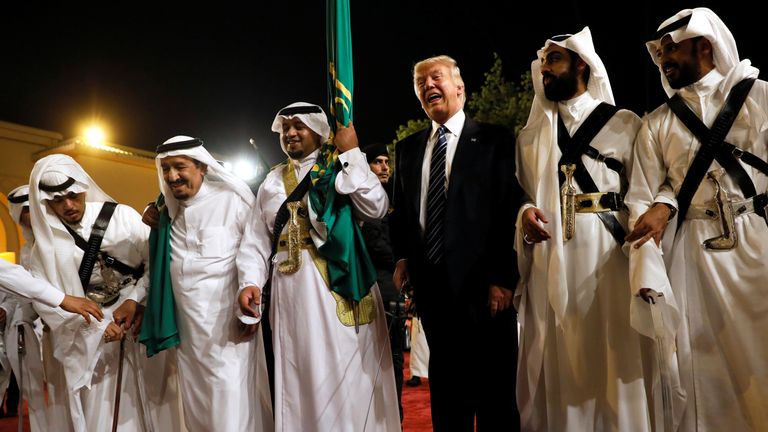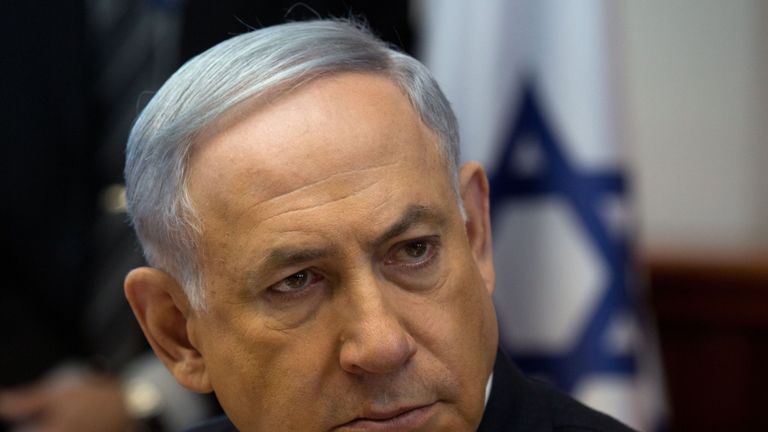Lebanese crisis a 'dangerous' twist in Iran-Saudi tensions
The confrontation between Iran and Saudi Arabia is moving in a new and dangerous direction, says Sky's Alex Rossi.
Sunday 12 November 2017 04:27, UK
The Russian revolutionary anarchist, Mikhail Bakunin, once warned: "Beware of small states".聽
He was referring to the disruptive power of small-state nationalism in 1870 in Europe; but he could very well have been predicting the role of Lebanon in the Middle East in the 20th and 21st Century.
The veteran journalist David Hirst aptly used those cautionary words for the title of his book about the country and its unfortunate, benighted role as the tip of the spear in the fight for primacy in the Middle East since the collapse of the Ottoman Empire.
With its sectarian patchwork, Lebanon may once again be the battleground where a regional standoff combusts.
It is not easy to read the runes of what is happening at the moment but it is certain that the confrontation between Iran and Saudi Arabia is moving in a new and dangerous direction.
::
The two countries are divided by a religious schism that spans centuries, but the roots of the present conflict can be traced back to the Iranian Revolution of 1979.
Saudi Arabia as the home of Islam's two holiest sites, Mecca and Medina, suddenly had a challenger.
There has been a great deal of hostility in the intervening period, but what is happening now in the context of the proxy wars in Yemen, Syria and Iraq is profoundly worrying.
It seems a new front in Lebanon may be added to that list.
Iranian influence has grown massively since Saddam Hussein was toppled by the US in 2003.
The country has consolidated those gains expanding what is often referred to as the Shia crescent, upsetting the delicate Sunni/Shia balance of power.
A land corridor, for example, now connects Tehran with Beirut on the Mediterranean.
Now imagine the Middle East as an onion and start pulling away the layers and you get an idea of the complexity of what is happening.
In the United States you have a President who has effectively called for regime change in Iran - that's one layer.
This is what he said in Saudi Arabia in May when he went there on his first foreign visit: "Until the Iranian regime is willing to be a partner for peace, all nations of conscience must work together to isolate Iran, deny it funding for terrorism, and pray for the day when the Iranian people have a just and righteous government that they deserve."
Factor those words into what is now unfolding in Saudi Arabia.
A young Prince and heir apparent, Mohammed bin Salman - who has the total backing of the US President - is concentrating power in his own hands.
In the last week he has presided over a revolution, sweeping away rivals - who were thought untouchable - in an anti-corruption purge.
And at the same time MbS appears to be pursuing an even more aggressive foreign policy.
::
Underneath that layer there is a new strategic alignment emerging between Saudi Arabia and Israel. Where did Mr Trump fly to directly after Riyadh? You remembered right, Tel Aviv.
Prime Minister Benjamin Netanyahu won't have needed any persuading about the dangers of Iran - he's been warning the world about its intentions for years and considers it Israel's number one enemy.
Now, with these new partnerships in place, consider the messaging after the shock resignation of the Lebanese PM seven days ago.
It happened not in Beirut as you might expect but in Saudi Arabia.
When Saad Hariri suddenly popped up live on pro-Saudi Al Arabiya television and stepped down, blaming Iranian influence, Riyadh, Washington and Jerusalem all sang from the same song sheet.
In apparent concert they all claimed this was an incontestable example of the dangers of an unchecked Iranian aggression that needs to be confronted.
With Mr Hariri no longer in office the Lebanese government is now effectively under the control of Hezbollah, an Iranian-backed Shia Islamist political party and militant group. It is also designated a terror organisation by the West.
Saudi Arabia is highly unlikely to go to war in Lebanon. It has its hands tied in an unwinnable and seemingly endless conflict in Yemen.
But Israel is a different matter. The Israeli defence establishment and the political class have for many months expressed fears about what is happening on their northern border.
If they expected Hezbollah - and Iran - to get knocked out in Syria, where they have been fighting (successfully) to prop up the Assad regime, they were wrong.
Hezbollah is arguably stronger now than at any time in its history.
Israel has been preparing for another war with the group since the last round of fighting in 2006.
Do not underestimate how worried Jerusalem is about Hezbollah's growing arsenal of weapons.
It now has a huge number of rockets that can hit any city or town in the country.
The conventional wisdom was that Israel knows it will have to fight Hezbollah again at some point but that it does not want to do so now. That analysis maybe shifting.
On Friday Hezbollah's leader, Hassan Nasrallah, claimed that Saudi Arabia had asked Israel to attack Lebanon and that Mr Hariri had been kidnapped.
He offered no evidence but it adds to an extremely confusing picture.
But there is another layer to what is a disturbingly dangerous standoff.
Hezbollah and Iran are fighting alongside Russia in Syria and no-one knows how the "Great Bear" will react if Lebanon becomes once again the theatre for another bloody, cynical Middle Eastern war.
Beware small states indeed.











